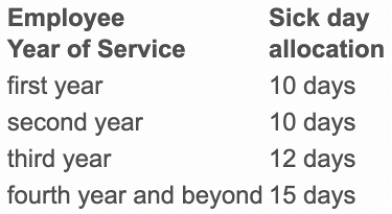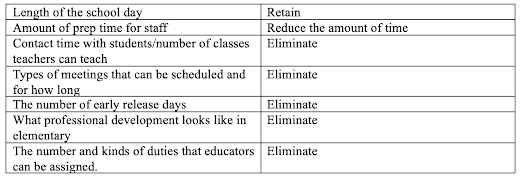For complete context, history, and next steps, go here.
The following is a collection of details and highlights from negotiations sessions between the NTA and School Committee over the course of the last year.
October 20, 2022
This initial meeting was to establish ground rules. No negotiation of the contract itself was done, but both sides expressed a desire for avoiding a lengthy, drawn-out process.
November 21
The School Committee’s opening proposal included:
• Fewer sick days and personal days, along with restrictions on use
• Increasing the number of educator work days
• Limiting access to the sick bank for employees
• Changes to health insurance, tuition free attendance by children of staff, and the Time and Learning Agreements
Initial NTA proposals included:
• COLA’s that addressed the current levels of inflation
o FY2024: 7.75% (to account for losses in earning power due to inflation)
o FY 2025: 4.5%
o FY2026: 4.5%
• Improved and more equitable longevity payments (educators who’ve reached top step and have been in the district for a certain number of years)
• Moving step increases back to September (recall they were moved to March back in 2011 in the wake of the Great Recession)
• Improved Unit C (aides, behavioral & occupational therapists, and other specialists) starting salaries
o Note that we currently have around 100 unfilled paraprofessional positions
• Improved substitute coverage
• Improved parental and family sick leave policies
• Improved technology infrastructure
• Increased tuition reimbursement budget
• Additional elementary prep time
• More equitable middle school meeting times
• Shift of meeting times in high school to mornings
• Improved evaluation protocols to support the growth of members on Directed Growth Plans and Improvement Plans
One thing that I would like you to take note of is the number of items on here which directly impact students. Attracting more Unit C folks to Newton, improving substitute coverage, improving technology infrastructure, and increasing prep time are all items which directly lead to a better experience for students.
November 30
During this session, the SC proposed changing the policy allowing staff members who live out of the district to enroll their children in NPS for free. The SC proposed charging materials fees and restricting access to special education services.
Additionally, the SC proposed the following restrictions on sick days:
This policy was, presumably, an attempt to decrease staff absenteeism within NPS.
However, the SC confirmed that they had not disaggregated the use of sick leave and sick leave bank days for new employees to see if the usage was meaningfully different. As such, they could not say how these policies would impact absenteeism.
December 8
The SC canceled this session.
December 21
The SC proposed forming a committee to review the elementary school day, but could not or would not state what it was that they thought needed to be examined about the school day.
They also shared that they have been “too busy” to schedule more than one additional bargaining session, leaving NTA with only one two-hour session per month over the next four months, essentially ruling out any progress until after the override vote on March 14.
But the biggest surprise of this session was the SC’s desire to scrap the Time and Learning Agreements. These agreements, originally negotiated in 1996-97, accommodate DESE regulations around time on learning. Below I’ve listed parts of the agreements, along with what changes the School Committee would like to make to each part of the agreement.
Given the large number of agreements the SC proposed to eliminate, the NTA was curious as to what the SC wished to replace these agreements with. In response, the SC was able to give only one example of a specific: they were only allowed to offer four early release days in middle school, and they wanted to change that.
In other words, the SC was seeking the NTA to write them a blank check – the SC referred to it as “flexibility,” but in reality, this would give the employer wide-reaching power over working conditions. It is difficult to overstate the amount of power this would give the SC. They could assign educators extra classes, create and assign additional duties, limit prep time, schedule meetings whenever they wanted, or change early releases. They could do all of these things without having to negotiate them, without having to consult any educators along the way, and with no additional compensation.
I want to emphasize that this was quite a radical request that would upend over twenty-five years of practice, especially given the SC’s inability to explain themselves beyond desiring greater flexibility.
January 25, 2023
This was a session that felt productive. The SC finally responded to several prior proposals, and agreements were reached or were close on several items, including Unit E entry level pay, sick day use for family/close friends, and tuition reimbursement.
February 13
More tentative agreements were reached on smaller items.
March 16
The SC still had no counter to the NTA’s COLA proposal, which meant that while more tentative agreements could be made on minor issues, there could be no substantial steps forward.
Additionally, the SC continued to push the elimination of the Time and Learning Agreements (explained in the December section).
They also proposed charging students of NPS employees attending NPS from out of district around $2,000 per year per child; for K-12, this amounted to around $33,000.
Further, the SC wanted discretion to refuse student admission or the right to send them back to their home district if their presence gave rise to “additional costs.”
Arguably, the SC was seeking the ability to refuse to allow the children of out-of-district educators the ability to enroll in NPS if they required special ed.
Furthermore, they sought to eliminate the NTA’s right to grieve (file a grievance) the district’s decisions on these issues. So, if the district tried to refuse a student because their special ed was “too expensive,” the NTA would be unable to fight back to protect this student.
In contrast, the NTA continued to push proposals that were actively beneficial for students. They had proposals on the table that would place a social worker in every building, as mental health support has been such a pressing need post-pandemic, along with improved substitute coverage and increased starting salaries for educational support staff.
March 24
This was not a negotiation session, but it was an important date nonetheless, as this was when Tamika Olszewski emailed the NTA and informed them that the SC “will likely be unable to meet the minimum staffing provision set forth in Article 3, Section 6 of the Unit C collective bargaining agreement (“CBA”) regarding Category 1 full-time Kindergarten Teaching Assistants (“KTA”).”
In other words, the SC cut kindergarten aides, which the contract expressly prohibits. I want to highlight here, again, that this is something that directly benefits students – because this is in the contract, the NTA is able to adjudicate this, and expects to win. This incident also highlights why the NTA is so reluctant to give the SC the flexibility they request; when they’ve shown a willingness to violate legal agreements, there is a real concern as to what they would do if there were not agreements outlining what they can and cannot do without bargaining.
April 4
For the first time, the SC responded to the NTA’s initial COLA proposal. The NTA initial proposal was:
FY2024: 7.5% (to account for losses in earning power due to inflation)
FY2025: 4.5%
FY2026: 4.5%
The SC responded with:
And the NTA counterproposal was:
April 26
The SC’s counter-proposal was:
And the NTA responded with the following proposal:
As a quick comparison, here’s a colorful and accurate chart from Newton Cartoons comparing the SC’s proposed COLA to some other districts’:
The SC continued to oppose full-time social workers in every building.
This was also around the time that Mayor Fuller cut retiree benefits and increased health insurance premiums.
May 18
The SC did not counter-propose on COLA, asked no questions, and when asked if they were going to reply, said “No.”
Small progress continued, with a tentative agreement reached on compensating middle/high school educators who cover classes of absent colleagues during their prep blocks.
June 1
Kathy Shields announced “a new phase” of bargaining by presenting a comprehensive package proposal.
The SC took all their proposals currently on the table, rejected all of the NTA’s, and said, “take it or leave it.”
This was unexpected and highly unusual. Package proposals like this are not presented until parties are much closer together in their proposals than the SC and the NTA were at this time, where they were quite far apart on COLA and other items. The SC’s revised COLA proposal was:
The SC next wrote up their “package proposal” as five Memoranda of Agreement as one would prepare a final agreement ready for ratification. They did this all despite the SC being quite far apart from the NTA on several items.
In return for the above-noted increased COLA by one tenth of one percent over three years, they asked the NTA to:
1) Withdraw proposals for things like adequate substitute coverage, increased planning time, and enhanced mental health supports for students.
2) Give the SC the contractual right to make changes to the work day with no further requirement to bargain these changes. This means they could add professional development days, decrease prep time, require that middle school teachers teach additional sections, and assign high school teachers teaching or other responsibilities for six out of seven blocks in the schedule.
3) Shift more rising costs of health insurance premiums onto employees by increasing out-of-pocket expenses.
4) Charge all employees who enroll their out-of-district children in NPS a fee of approximately $2,300 per year
5) Expel or deny admittance to out-of-district children of NPS employees who require special education services.
June 12
The SC continued to insist on the proposal that bundles their terms into one package and rejects all the NTA’s proposals.
July 20
Leading into this meeting, the SC could find zero available dates in all of August to schedule additional bargaining sessions.
The NTA counterproposed the following COLA, again demonstrating a willingness to come down and negotiate.
The SC declared that they would be filing with the state that negotiations had reached the impasse. They asked the NTA if they would like to also file, and the NTA declined, as they did not feel that they were at a true impasse, but rather that the SC had negotiated in bad faith, suspecting this as their planned conclusion all along.










Comments
Post a Comment